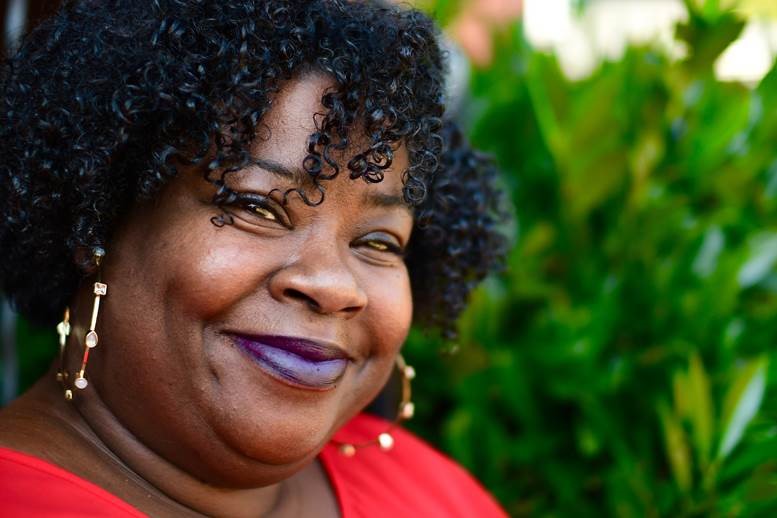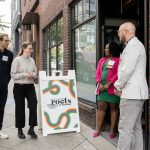
Brandie Flood has been serving people who struggle with homelessness and drug use for more than ten years at REACH.
Brandie was born and raised in the Rainier Beach neighborhood in Seattle. Her work with REACH is steeped in the values of harm reduction, street outreach, radical hospitality, and racial equity. She lives by the principle from Dr. Cornel West, that “justice is what love looks like in public—to be human is to love and be loved.”
Brandie is one of the keynote speakers at our 3rd Annual Event: Roots of Recovery on September 30th. Buy tickets to this live zoom event on our website to learn more about ETS’s work and to celebrate the lives of our patients and clients in recovery.
ETS: How did you get into this line of work? And what’s your background?
Brandie Flood: I was raised in a multi-generational household. In fact, I still live in my grandmother’s home that I inherited. My parents struggled with drug use and my grandmother took us all in. Without her, I most likely would have had a life of foster care. I think of my grandmother as REACH before REACH ever existed. She practiced harm reduction without knowing what harm reduction was.
As a kid, I didn’t understand it. I thought, “Why do we keep helping everybody out? There’s not very much food for us, why are we giving it to other people?” In fact, when I first started at REACH, I met some clients who knew my grandmother and had been helped by her. Unlike so many people who were implementing “tough love” approaches at the time, my grandmother always made sure we got time with our parents. Safely, of course, but she understood that their drug use didn’t mean they were terrible people, and that they still needed to love and feel love. It was a family unit, and even when some people were failing, everybody upheld everybody.
I went on from my home experience and got a bachelor’s degree in human services and a master’s in social work. I thought for a minute that I might want to be a teacher, after an old superintendent in Seattle, John Stanford, visited my high school in Rainier Beach. He said, “If you don’t love the kids in your class, you can’t serve them.” That stuck with me; the desire to teach did not.
That’s what led me to REACH. During my MSW, I worked in health disparities around tobacco prevention, infant mortality, and HIV and AIDS, particularly focused on the Black community at the Center for Multicultural Health. When I graduated, I wanted to be in a place where I could do some case management and counseling. Finding REACH was like being home in my grandmother’s house. It’s an environment where people care about each other. At REACH, I put a name to my grandmother’s style of love—harm reduction and radical outreach.
What do you think about harm reduction as a practice?
I think of harm reduction as a kind of liberation, especially for Black folks. I was fortunate and had the luxury—or more correctly, the privilege—as a younger person to “skate on ice” while I figured out what I wanted for my life. I could make mistakes and know that my people were still going to find me, love me, and help me regardless of what I did.
It wasn’t long before I realized that not everyone has that support. When the Black folks in my caseload didn’t show up for an appointment or were using and out of touch for a while, they would avoid me, thinking that I’m not going to show up for them anymore. I often had to sit them down and repeat: “I’m going to show up for you, every time. You can cuss me out, relapse, whatever. I’m going to be here until we get this right.” Then after they learned to trust me, to see that I did show up when I said I was going to, we could keep trying different things, working together to make changes in their lives.
To realize that you will be cared for not because of what you do, but because you inherently have worth? That’s freedom. Harm reduction is freedom for folks.
How long have you been at REACH? What is your current role?
I started working at REACH nearly ten years ago, in December of 2011. Currently, I’m the program manager for LEAD—Law Enforcement Assisted Diversion. The LEAD program is a partnership between REACH, King County, and the Defender’s Association that helps people with addiction get the support they need rather than jail time and criminal records that often set them back even further. The REACH team connects with clients and supports them as they set goals, access services, and make changes in their lives.
The program has strong evidence of success and continues to grow. I supervise key people on our team in leadership roles. I work on clinical planning and do a lot of advocacy in the community. I talk about the program as a public safety model, support our partners, and advocate for resources from City Council members and King County folks.
We’re also expanding into different places—Burien, and the North, East, and South Precincts of Seattle. In the Rainier Valley and Rainier Beach area, we’re looking for more culturally competent partners to take on LEAD case management. We want local groups with BIPOC leadership to step into that role, so we’re working on ways to support with the training and funding to build the skillsets and capacity these programs need.
REACH is always thinking about who needs to be at the table to serve various communities in the region as, unfortunately, most of the LEAD clients are BIPOC just by the way our criminal punishment system is structured and biased. We want to make sure that we are bringing on partners that have a racial equity mindset.
Have any of your clients had a particular influence on your life?
When I first started working with REACH, before I worked on the LEAD side of the organization, I had a client named Belinda. I’ve had a lot of clients who’ve made an impact on my life, but she was my favorite and she’s on my mind because I just found out last night that she passed away. It’s been a tough day. I do not want to go into the details of her story because she is no longer able to permit us to share, but it is tragic, and, unfortunately, not surprising. Her story follows a pattern we see with many clients.
I’ve focused my work on racial oppression and helping the Black community because clients like Belinda shouldn’t have to live through what she lived through. From a lack of social safety net and safe housing to her interactions with the criminal punishment system, she was not given the opportunities or second chances that many people have. People are not just inherently bad or worthless; people do not want to be stuck in a cycle of addiction and homelessness.
It’s hard to talk about this in a country where most people still think it’s possible to “pull yourself up by your bootstraps” without considering that this is only possible for a privileged few. For Belinda, the message she received from our society’s narrative was that if you were smarter, better, or stronger, you would have been able to make it and these terrible things wouldn’t happen to you. You would deserve a better life, but as you are, you are worthless.
Belinda reminded me of my mother in so many ways. My mother was not just a heroin user, though I’m sure that’s how many people saw her. She used to drive Metro. She was in methadone treatment at ETS. She was a million wonderful things. There were times when I was talking to Belinda or she would look at me in a certain way and I could see my mother. My mother and I had a relationship, but if I had the harm reduction skillset I have now, it could have been so much better. Loving Belinda helped me have more compassion for my mother who passed away years ago.
For people who do not know much about REACH, what are some key challenges that clients face?
Despite the traumas that people like Belinda have been through, the systemic barriers they face are worse. At REACH, we do all this work to build rapport and get somebody to believe they’re worthy of services like housing, healthcare, and mental health services. Then you get to the door and there are 10 million things that have to happen before they can access those services. Or for some reason, they don’t meet this one little part of the criteria for services and can’t get the help that they deserve.
For people without barriers, the mental and behavioral health sector can be difficult to access. For our clients, it’s nearly impossible. They just don’t fit the mold of the “deserving poor” which often means White, mentally stable, and non-drug users. I mean, I’ve worked with people where it’s taken a year to get a government-issued ID, and that’s just the first step for so many services.
Do you have any personal mantras or things that you keep in mind as you do this difficult work?
“Love them anyway.” I use this one a lot. This ties back to the story about the superintendent we spoke about at the beginning of this interview. We can’t serve our clients unless we love them. So, no matter what they do or say to us, our job is to love them anyway. When I first started working with REACH, I worked in medical respite. I can’t tell you how many racist White men I had as clients who would have wanted anyone other than a Black woman with them when they died. Despite their resistance, racism, and cruelty, I loved them anyway. Often, by the time they died, they loved me too.
Why should people who are reading this interview support REACH’s work?
The biggest crimes that have ever happened in our country are the genocide of Indigenous people and slavery. Drug use and extreme poverty are not crimes. In many ways, poverty and drug use are the direct results of the crimes inflicted on BIPOC people. If people really had that understanding, we would all look at the criminal punishment system a lot differently and allow ourselves to think that maybe these people are not criminals. Maybe they’re victims of a very damaged system that is designed to hurt people.
Supporting REACH is understanding that we’re all in this together. That we need to fix these systems together—whether you have housing or not. It’s not just REACH’s responsibility; it’s not just social or homeless service organizations’ responsibility. It is the responsibility of our whole society because we have created this system and it is atrocious. We need to work together to try something else.





I shout out to you Miss Brandi!
You are such a great advocate.
Cat Jobes, RN formerly at The Simons
Now at HMC Addiction Consult Service
Brandie,
What a great interview!! I have heard a lot of great things about you over the years but I finally feel like I know you!
I truly admire you for the work that you do and your service to the people of Seattle. My home town.
I hope that when life returns to some semblance of normal that we can meet in person.
Sally Majkut
Bellingham
Great interview! Amazing!?